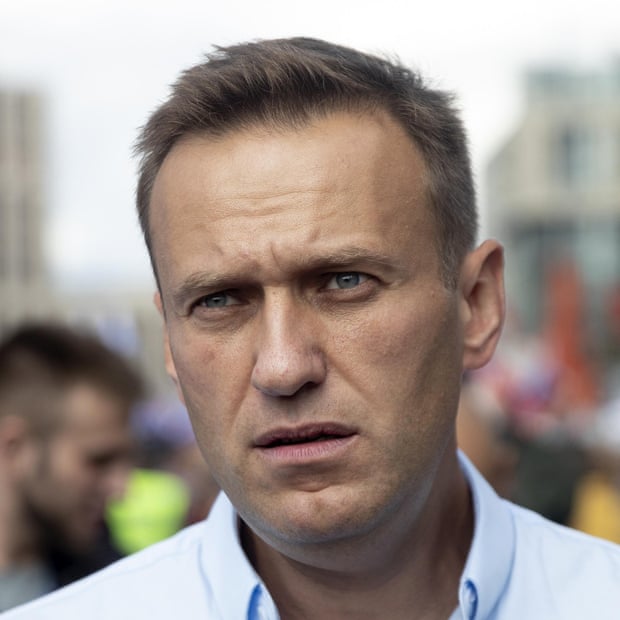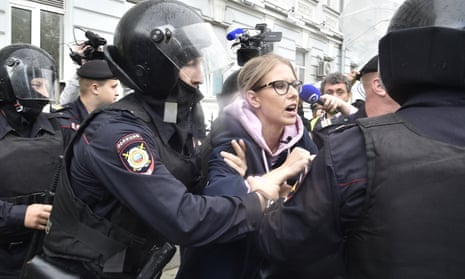Riot police in Moscow made mass arrests on Saturday in an attempt to quash a protest rally that had been banned by authorities.
The rally was the latest episode of a nascent protest movement, triggered by a refusal to let opposition candidates stand in Moscow parliamentary elections, which has led to the biggest political protests in Russia for years.
During the protest on Saturday afternoon, police detained about 828 people, according to the independent monitoring group OVD-info.
Police said they had detained 600 and that 1,500 had attended the protest. Activists said 10,000 had taken part.
The Russian capital was on lockdown as authorities closed off access to the central boulevard ring, where protesters wanted to march, blocked mobile internet reception in large parts of the capital and kept an eye on protesters from a helicopter overhead.
Lyubov Sobol, the only opposition politician who wanted to stand in September elections not currently in jail, was detained by police before she could even arrive at the protest.
Sobol, who is three weeks into a hunger strike in protest at the lack of access to the ballot, gingerly emerged from her campaign headquarters to get into a waiting taxi, but was pulled out by riot police, who dragged her to a waiting bus while she shouted out in protest.
Several restaurants and shops along the boulevard were closed for the day, and riot police officers wore balaclavas, a measure usually reserved for high-profile drugs and extremism cases, after protesters identified several police officers after last week’s protest using online facial identification software.
Protesters said they were concerned that the authorities were provoking a clash with police. One protester, who gave her name as Lyudmila, pointed at the barricades. “Moscow has been occupied,” she joked.
One father, who was attending the protest with his two school-aged daughters, said he was worried about the possibility of violence. “But it’s important to show we are not afraid,” he said. He asked not to be named.
As the protest was spread out over a large area, it was hard to gauge the number of people who had turned out. Initial estimates suggested it may have fallen short of the numbers who turned out last weekend for a rally outside the Moscow mayoralty that saw the harshest police crackdown in Russia for nearly a decade.
Then, more than 1,300 people were detained by police, and although most of them were released soon after, authorities have made it clear they are planning a major crackdown. They have launched a case against 10 protesters for causing “mass unrest”, which carries a jail sentence of up to 15 years, and have also threatened to search for draft-dodgers among men detained at the protest.
On Saturday, Russia’s investigative committee also announced it was launching a money laundering investigation into the Anti-Corruption Foundation, run by leading opposition politician Alexei Navalny, who is currently in jail.
ProfileWho is Alexei Navalny?
Show

Born in 1976 just outside Moscow, Alexei Navalny is a lawyer-turned-campaigner whose Anti-Corruption Foundation investigates the wealth of Vladimir Putin’s inner circle.
He started out as a Russian nationalist, but emerged as the main leader of Russia's democratic opposition during the wave of protests that led up to the 2012 presidential election, and has since been a thorn in the Kremlin’s side.
Navalny is barred from appearing on state television, but has used social media to his advantage. A 2017 documentary accusing the prime minister, Dmitry Medvedev, of corruption received more than 30m views on YouTube within two months.
He has been repeatedly arrested and jailed. The European court of human rights ruled that Russia violated Navalny's rights by holding him under house arrest in 2014. Election officials barred him from running for president in 2018 due to an embezzlement conviction that he claims was politically motivated. Navalny told the commission its decision would be a vote 'not against me, but against 16,000 people who have nominated me; against 200,000 volunteers who have been canvassing for me'.
There has also been a physical price to pay. In April 2017, he was attacked with green dye that nearly blinded him in one eye, and in July 2019 he was taken from jail to hospital with symptoms that one of his doctors said could indicate poisoning. In 2020, he was again hospitalised after a suspected poisoning, and taken to Germany for treatment. The German government later said toxicology results showed Navalny was poisoned with a Novichok nerve agent.
Navalny was sent to prison again in February 2021, sentenced to two years and eight months, in a move that triggered marches in Moscow and the arrest of more than 1,000 protesters. By April he was described as being "seriously ill" in prison.
A number of protesters said they attended Saturday’s demonstration because they were angry about the violence that overtook last week’s protests. “We’re all against violence, but we have our right to protest, to give voice to our opinion about what’s happening in this country,” said 33-year-old Sergey Kasatkin. “I think [the authorities] overreacted and this is our response.”
Most of the opposition leaders are in jail, having been given short sentences of between seven and 30 days as a short-term measure to keep them away from the protests. Navalny was jailed for a 30-day term last month. He was taken to hospital last weekend with symptoms that his personal doctors said indicated potential poisoning, but has since recovered.
